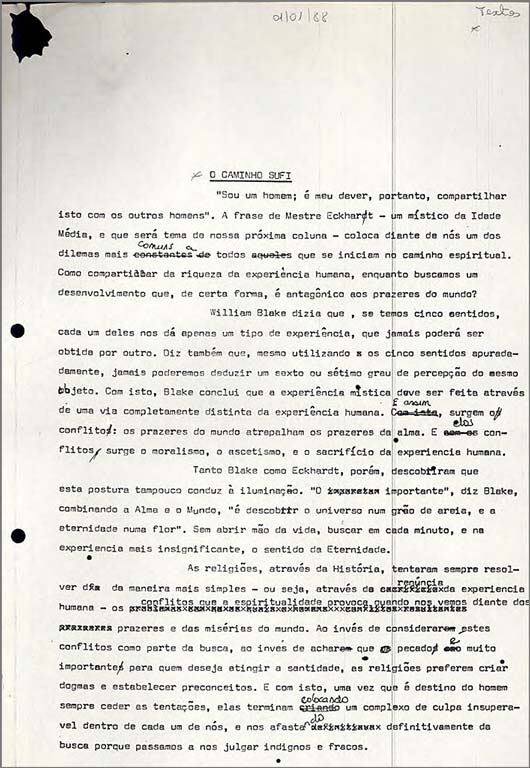

Original title: O Caminho Sufi. Pdf, 2 pages.
“Sou um homem; é meu dever, portanto, compartilhar isto com os outros homens”. A frase de Mestre Eckhart – um místico da Idade Media, e que será tema de nossa próxima coluna – coloca diante de nós um dos dilemas mais comuns a todos que se iniciam no caminho espiritual. Como compartida da riqueza da experiencia humana, enquanto buscamos um desenvolvimento que, de certa forma, é antagônico aos prazeres do mundo?
William Blake dize que, se temos cinco sentidos, cada um deles nos dá apenas um tipo de experiencia, que jamais poderá ser obtida por outro. Diz também que, mesmo utilizando os cinco sentidos apuradadamente, jamais poderemos deduzir um sexto ou sétimo grau de percepção do mesmo objeto. Com isto, Blake conclui que a experiencia mística deve ser feita através de uma via completamente distinta da experiencia humana. E assim, surgem o conflito: os prazeres do mundo atrapalham os prazeres da alma. E elos conflitos surge o moralismo, o ascetismo, e o sacrifício de experiencia humana.
“I’m a man; it is my duty, therefore, to share this with other men”. The phrase by Master Eckhart – a mystic of the Middle Ages, and which will be the subject of our next column – poses before us one of the most common dilemmas for everyone who starts on a spiritual path. How do we share the richness of human experience, while we seek a development that, in a way, is antagonistic to the pleasures of the world?
William Blake says that if we have five senses, each of them gives us only one type of experience, which can never be obtained by another. He also says that, even when using the five senses accurately, we can never deduce a sixth or seventh degree of perception of the same object. With this, Blake concludes that the mystical experience must be done in a completely different way from the human experience. And so, conflict arises: the pleasures of the world hinder the pleasures of the soul. And out of conflicts arises moralism, asceticism, and the sacrifice of human experience.

 Back To Top
Back To Top